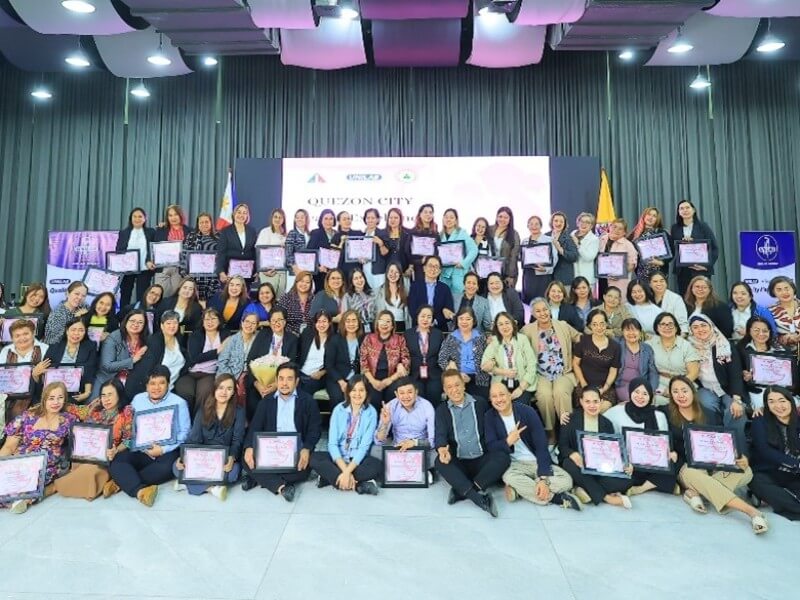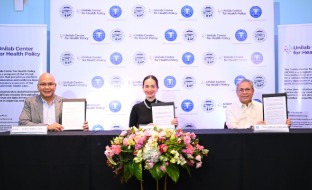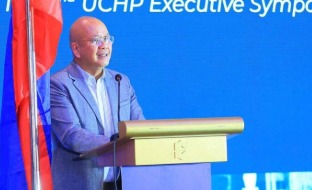Unilab Foundation, UP sign MOA for PhilHealth supplemental benefits study
Unilab Foundation, UP sign MOA for PhilHealth supplemental benefits study

The initiative is the long-unrealized mandate under Section 11 of the Universal Health Care (UHC) Law
In their common desire to help universal health care implementation in the country, the Unilab Foundation, Inc. and the University of the Philippines (UP) Manila formalized a partnership to study and develop a supplemental benefits package for PhilHealth members. The memorandum of agreement lays the groundwork for what is being called the most comprehensive collaboration yet between the private sector and the national university on UHC policy development.
The study, titled “PhilHealth Benefits Enhancement: Assessing the Implementation of Supplemental Insurance Coverage for PhilHealth Members,” is the first research project on UHC involving different departments within the UP System. It is being funded by the Unilab Center for Health Policy (UCHP), the UHC policy think tank of the Unilab Foundation, in cooperation with academic experts from UP Manila and UP Diliman and involves regional academic educational institutions like the West Visayas State University.
The focus of the initiative is the long-unrealized mandate under Section 11 of the Universal Health Care (UHC) Law, which empowers PhilHealth to create and manage a supplemental benefit fund. While the UHC Law was enacted in 2019, progress on this specific provision had stalled.
“This MOA is more than just a formal document. It’s a symbol of shared vision, trust, and commitment. It represents real hope for tangible benefits, especially for those who need them most,” said Atty. Jose Maria A. Ochave, executive director of the Unilab Foundation. “Through the years, I have learned that meaningful change comes from collaboration among players, not from sideline criticisms.”
He emphasized the importance of government in driving systems change, while recognizing the vital role of civil society and corporate foundations showing that recommended changes are viable. “Oftentimes, the business sector and civil society organizations suffer from the conceit that they can make significant and long-lasting changes in society without government adopting those changes. The reality is only government has the resources and reach to effect these changes. The proper role for us is to show that whatever changes we advocate can be done by having pilot studies grounded in reality. Once we are successful, then we should engage the relevant government agencies so they can review the results and, if they find acceptable, scale up what we have piloted,” he said.
Responding to the call for local health reform
The research initiative is a direct response to Health Secretary Teodoro Herbosa’s call for local actors to take greater responsibility in financing and shaping national health priorities. In a widely cited statement, Herbosa remarked that in today’s shifting global landscape, “the responsibility to fund health initiatives cannot fall solely on international donors.”
UCHP has taken this directive to heart. According to program director Ruben “John” Basa, the center was created by the Unilab Foundation as a non-commercial policy platform to bring the public and private sectors together in pursuit of meaningful reform.

“When we thought about regaining the momentum of UHC, we needed a platform where government and private institutions can come together to push forward the objectives of UHC. That’s why the Unilab Foundation created the Unilab Center for Health Policy,” Basa said.
The study builds on UCHP’s 30-year retrospective analysis of the Philippine National Health Accounts (PNHA), which revealed that PhilHealth’s share in total health spending remains well below target, slipping to just 10.2 percent in 2023. At the same time, private out-of-pocket spending has stagnated at 45 percent, far above the 30-percent ceiling outlined in the government’s health financing roadmap.
“Through our national health accounts study, we found that PhilHealth and LGUs, two major sources of health financing, are still underperforming. It’s time to fix that, and this partnership is a step forward,” Basa added. “The development of the supplemental benefits package is not just a policy aspiration. It is already within PhilHealth’s mandate. We’re here to help ensure that it is designed well and backed by data.”
UP System’s policy leadership on full display
The University of the Philippines, through UP Manila, has taken a leadership role in the partnership. Chancellor Dr. Michael Tee described the study as a model for “Academe-Government-Industry engagement” and reiterated that UP’s mandate includes public policy development, not just academic instruction.
“This is how we ensure that the excellence of UP, our expertise in medicine and health sciences, reaches even the most isolated communities,” Dr. Tee said. “We don’t want this study to be a flash in the pan. We want it to be something we can defend and use to push for supplemental benefits that give our people real access to healthcare.”
He added that the project was born from a brainstorming session earlier this year. “Impact and implementability – if it does not improve lives or cannot be done in the real world, then it’s not worth doing. This is why we take pride in this project. We know it will serve the Filipino people in a real and tangible way and it can be done.”
PhilHealth eyes rollout of new benefit package
PhilHealth, which is both a stakeholder and the implementer of the study’s potential outputs, expressed support for the initiative. Dr. Maria Franchina Ruby, Medical Specialist under the Office of the Executive Vice President and COO, said the research aligns with PhilHealth’s roadmap to fulfill its mandate under the UHC Law.
“PhilHealth is mandated under Section 11 of the UHC Law to manage a supplemental benefit fund. This study will help us shape our policy and operations to fulfill that mandate,” Ruby said.
She noted that internal timelines have been discussed. “We hope to roll out the program within the year. Once the research is complete and we translate it into policy, our target is to approve and publish guidelines in about three months.”
She also pointed out that the coverage being studied could serve populations traditionally underserved by commercial insurance. “This study will have a real impact, especially for Filipinos who can’t afford private insurance. By offering supplemental coverage at a lower cost, we can help reduce out-of-pocket expenses across the board,” she said.
Building a sustainable, data-driven model
The study will be spearheaded by Dr. Hilton Lam of the UP Manila National Institutes of Health and co-developed with PhilHealth’s senior management. Key members of the academic team include Dr. Rizaldy Capulong and Dr. Jaime Caro of UP Diliman, Dr. Guido David of the UP Institute of Mathematics, and Dr. Joselito Villaruz of West Visayas State University.
Deliverables from the six-month study include a supplemental benefits design, costing model, and implementation plan. The recommendations will be submitted to PhilHealth and the Department of Health for their consideration.
The initiative complements UCHP’s previous work with the Philippine College of Emergency Medicine on the One Hospital Command Center, a DOH project requested by Secretary Herbosa. It also follows the institution’s flagship research on the Philippine National Health Accounts and performance-based provider payments.
“We don’t start projects that we can’t finish. When we start something, we’re committed to seeing it through to the end,” Ochave said.
A shared commitment to systemic change
The MOA signing was witnessed by key officials from Unilab Foundation, UP Manila, and PhilHealth. At the signing table were Atty. Jose Maria Ochave, Dr. Michael Tee, and Dr. Hilton Lam.
From PhilHealth, representatives included Dr. Ruby, along with Ms. Maribeth Adsuara and Senior Manager Lei Formadero. Joining the audience were Dr. Jovencio Villaflor, former President of the Philippine College of Surgeons and member of the PhilHealth Advisory Council; Dr. Bernie Bernardo; and members of the UP and UCHP advisory and technical teams.
As the study begins, all eyes are now on whether this tripartite initiative, covering the academe, the private sector, and government, can serve as a replicable model for multisectoral reform.
“Honor and excellence only matter when used to serve,” Dr. Tee concluded. “And this is how we serve: through policy, science, and partnerships.” – Rappler.com
Other Related News
 alt="" draggable="false">
alt="" draggable="false">
Watsons and Unilab Unite 8,000 Runners for Share the Alaga Run at SM Mall of Asia
Watsons Philippines and Unilab gathered 8,000 runners at the Share the Alaga Run, promoting proactive health and everyday wellness for Filipinos nationwide.
 alt="" draggable="false">
alt="" draggable="false">
WINNING: QC expands private maternal care network
Quezon City is quietly expanding its network of high-performing private maternal care providers, signaling a broader push to strengthen frontline healthcare delivery through public-private partnerships.
 alt="" draggable="false">
alt="" draggable="false">
Unilab Foundation partners with Ormoc LGU to boost healthcare delivery in far-flung areas
The Unilab Foundation, through its research and policy arm Unilab Center for Health Policy (UCHP), has partnered with the local government of Ormoc City
 alt="" draggable="false">
alt="" draggable="false">
Unilab delivers Quality Alaga at Sinulog
As part of its commitment to deliver Quality Alaga to Filipino communities, Unilab, Inc. partnered with the Basilica Minore del Sto. Niño and medical professionals to provide first-aid treatment to those who would need it during Sinulog festivities from January 17 to 18.
 alt="" draggable="false">
alt="" draggable="false">
First aid on site: Unilab backs crowd safety at Peñafrancia Festival
Unilab, through Alagang Unilab, set up first-aid stations and medical teams with the Naga Basilica for the Peñafrancia Festival, extending on-site care to thousands of devotees.
 alt="" draggable="false">
alt="" draggable="false">
Study points to local health spending gaps
A new study by the Ateneo Policy Center and Unilab Center for Health Policy highlights inefficiencies in how local government units (LGUs) spend their health budgets, prompting the Department of Budget and Management (DBM) to call for fiscal reforms.